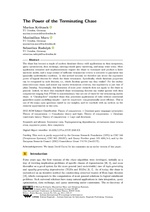The Power of the Terminating Chase
From International Center for Computational Logic
The Power of the Terminating Chase
Markus KrötzschMarkus Krötzsch, Maximilian MarxMaximilian Marx, Sebastian RudolphSebastian Rudolph
Markus Krötzsch, Maximilian Marx, Sebastian Rudolph
The Power of the Terminating Chase
In Pablo Barceló, Marco Calautti, eds., Proceedings of the 22nd International Conference on Database Theory (ICDT 2019), volume 127 of LIPIcs, 3:1--3:17, 2019. Schloss Dagstuhl - Leibniz-Zentrum für Informatik
The Power of the Terminating Chase
In Pablo Barceló, Marco Calautti, eds., Proceedings of the 22nd International Conference on Database Theory (ICDT 2019), volume 127 of LIPIcs, 3:1--3:17, 2019. Schloss Dagstuhl - Leibniz-Zentrum für Informatik
- KurzfassungAbstract
The chase has become a staple of modern database theory with applications in data integration, query optimisation, data exchange, ontology-based query answering, and many other areas. Most application scenarios and implementations require the chase to terminate and produce a finite universal model, and a large arsenal of sufficient termination criteria is available to guarantee this (generally undecidable) condition. In this invited tutorial, we therefore ask about the expressive power of logical theories for which the chase terminates. Specifically, which database properties can be recognised by such theories, i.e., which Boolean queries can they realise? For the skolem (semi-oblivious) chase, and almost any known termination criterion, this expressivity is just that of plain Datalog. Surprisingly, this limitation of most prior research does not apply to the chase in general. Indeed, we show that standard–chase terminating theories can realise queries with data complexities ranging from PTime to non-elementary that are out of reach for the terminating skolem chase. A “Datalog-first” standard chase that prioritises applications of rules without existential quantifiers makes modelling simpler – and we conjecture: computationally more efficient. This is one of the many open questions raised by our insights, and we conclude with an outlook on the research opportunities in this area. - Projekt:Project: CRC 248, DIAMOND, DeciGUT, HAEC B08
- Forschungsgruppe:Research Group: Computational LogicComputational Logic, Wissensbasierte SystemeKnowledge-Based Systems
@inproceedings{KMR2019,
author = {Markus Kr{\"{o}}tzsch and Maximilian Marx and Sebastian Rudolph},
title = {The Power of the Terminating Chase},
editor = {Pablo Barcel{\'{o}} and Marco Calautti},
booktitle = {Proceedings of the 22nd International Conference on Database
Theory (ICDT 2019)},
series = {LIPIcs},
volume = {127},
publisher = {Schloss Dagstuhl - Leibniz-Zentrum f{\"{u}}r Informatik},
year = {2019},
pages = {3:1--3:17}
}

